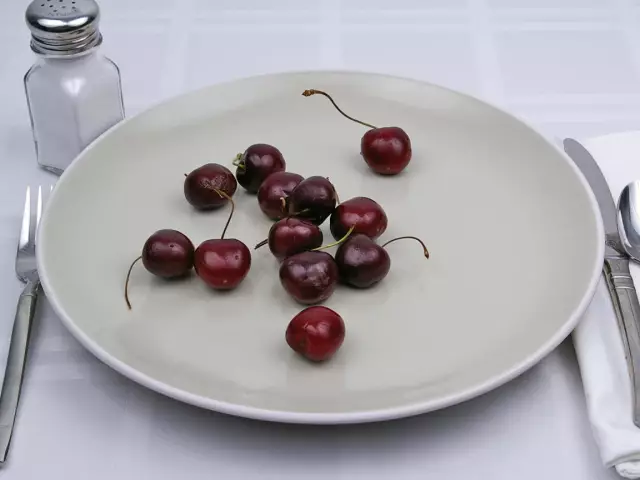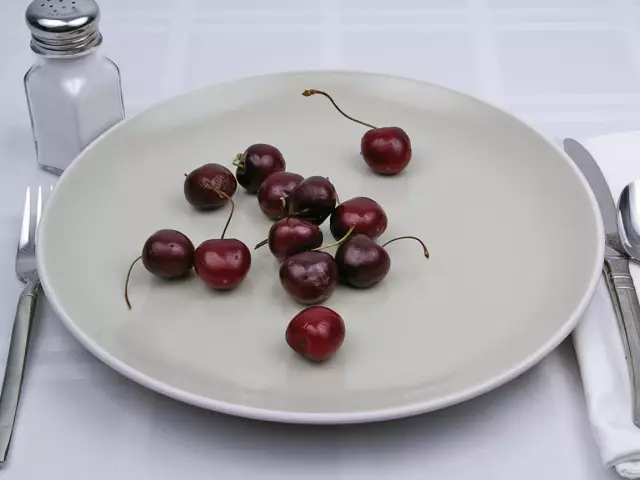- Author Rachel Wainwright [email protected].
- Public 2023-12-15 07:39.
- Last modified 2025-11-02 20:14.
Cherry
Cherry is a widespread fruit plant. Since ancient times, its fruits have been used not only for food, but also as a rich source of vitamins and useful microelements. Today cherries are cultivated in many countries and, according to some estimates, there are about 200 varieties.
The ratio of BJU in the product

Source: depositphotos.com How to burn 50 kcal?
| Walking | 13 minutes |
| Jogging | 6 minutes |
| Swimming | 4 minutes |
| A bike | 7 minutes |
| Aerobics | 10 min. |
| Household chores | 17 minutes |
Useful properties of cherries
Sweet and sour cherry fruits in their chemical composition contain many useful organic acids - citric, malic, salicylic and succinic, sugars, pectin substances, folic acid, vitamins A, C, E, B1, B2, PP, as well as micro- and macroelements, including zinc, potassium, copper, phosphorus, manganese, iron, iodine, chromium, molybdenum, fluorine, boron, calcium, vanadium, nickel, cobalt, rubidium, and magnesium. The calorie content of cherries is low - only 49 kcal per 100 g of ripe berries.
The main beneficial properties of cherries include bactericidal and anti-inflammatory qualities. It is thanks to them that cherries have a rather rare ability for fruits to destroy streptococci and staphylococci, as well as affect the causative agents of dysentery.
The anthocyanidins contained in the fruit pulp reduce the uric acid content in the body. Due to this, cherries are used in folk medicine for gout and arthritis.
Fresh fruits are able to quickly eliminate joint inflammation and relieve pain.
P-vitamin-active tannins with ascorbic acid and pigments contained in cherry fruits help to strengthen blood capillaries and increase their tone, which helps prevent hemorrhages. Cherries are also useful for lowering high blood pressure. These benefits of cherries are backed up by many medical studies, as they have shown a decrease in heart attack rates in those who regularly include them in their diet. Also, cherry fruits help to quickly increase hemoglobin levels.
Coumarin, which is part of the pulp of berries, reduces blood clotting, so fresh cherries are useful for the prevention of some complications of arterial atherosclerosis.
The copper contained in cherries makes it useful in the treatment of mental illness and epilepsy. Also, the fruits are often used in the treatment of colds as an antipyretic agent, as well as an expectorant for coughs and bronchitis.
Fresh berries or juice from them are considered the most useful. Cherry juice is considered one of the leaders among fresh juices for its medicinal qualities. The beneficial properties that it possesses have a general strengthening effect and help to improve metabolic processes in the body.
It is useful to drink cherry juice for anemia, both for prophylaxis and for treatment, since magnesium, cobalt, iron, pigments and vitamins C and B group included in the chemical composition of berries are easily absorbed by the body and do not cause side effects. It is believed that one glass of cherry juice contains 25 times more antioxidants than juices from other vitamin-rich fruits and vegetables.
Another useful property of cherries is the ability of the fruits of this tree to remove nitrogenous toxins from the body.
There are useful substances not only in fruits, but also in seeds, stalks, leaves, roots and bark of a tree. Berry seeds contain essential and fatty oils and amygdalin glycoside, bark - coumarin, tannins, amygdalin.
According to some studies, cherry seeds contain ellagic acid - vitamin B 17, which blocks the development of cancer cells. However, today there is no unequivocal opinion of scientists about the effectiveness of using these properties in oncology.
Cherry application
Fresh cherries are most useful. To increase hemoglobin and prevent the development of cardiovascular diseases, it is enough to drink a glass of fresh cherry juice a day. It is very useful to drink juice during pregnancy, since the folic acid in its composition helps to protect the child from the development of various pathologies. To make cherry juice, it is best to combine several varieties of cherries. The best results are obtained by a combination of aromatic medium-sized varieties with juicy and fleshy ones.
With dysentery, as a diuretic, as well as a hemostatic agent for prolonged and heavy menstrual bleeding, you can prepare a decoction from the stalks of berries, for which 2 teaspoons of the stalks of cherries are boiled in a glass of water and infused for several hours. Apply the resulting broth in a tablespoon up to 4 times a day. Also, a decoction of the stalks of berries has an astringent effect.

Infusion of cherry roots is used for stomach ulcers, and from the bark - for cramps, rheumatic pains and neuroses. The broth is prepared from one tablespoon of the root or bark and drink a glass daily. Decoctions from young cherry branches are used for chronic colitis and diarrhea.
Cherry leaves are often included in medicinal preparations. For kidney diseases, they are used simultaneously with blackberry leaves, red clover heads and tansy flowers, for anemia and inflammatory diseases - with rowan leaves and flowers of thyme and calendula, for colds - in equal proportions with chamomile.
In cosmetology, cherries are most often used for oily skin. The pulp of fresh fruits tightens enlarged pores and helps to get rid of acne, as well as makes the skin supple and healthy, while protecting it from external influences.
Contraindications
Eating cherries in large quantities is contraindicated in diabetes and obesity due to the high sugar content in it. With caution, you need to include it in your diet with increased acidity of gastric juice and gastric ulcer. Also, eating cherries is contraindicated in chronic inflammatory processes and digestive disorders.
YouTube video related to the article:
Found a mistake in the text? Select it and press Ctrl + Enter.






